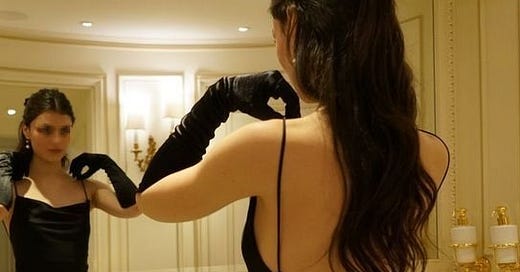I think my confidence peaked at age 8. I was the girl who’d put herself forward for the school play. Who’d approach strangers without much second thought. Who’d raise her hand in class with a straight arm - so eager that her bum was off the seat.
By age 11, something shifted. I became aware of other people's perceptions of me, which turned into self-consciousness, which seemed to shrivel up my confidence. I became the girl who dreaded the idea of being in a school play. Who’d only speak up in class if I was called on. Who preferred to stick to people I knew.
By my mid-20s, I thought the markers of “success” I'd collected would somehow make me feel more confident. Not quite. I was still the girl (woman now, I guess) who’d get nervous speaking up in a meeting. Who’d try to escape networking events. Who’d default to asking questions so I didn’t need to talk about myself.
It turns out confidence doesn't just land on your lap because of external validations. You have to grow it from inside out.
A while back, J said in an unusually exasperated tone: “Got told today that I need to project more confidence. I know that! I feel that! But what the heck is confidence anyway?”
I paused.
We throw around that term a lot. She's so confident - look at the way she speaks. Or I wish I had that kind of confidence. Or with an eye roll: He's way too confident for his own good.
Yet I struggled to define “confidence” without reducing it to behaviors.
“Well, I guess she probably means you should be more assertive and sure of yourself when you share your thoughts? Something like that?”
That didn’t feel right. What is confidence anyway? Some reflections:
—
Confidence isn’t being the best in the room. It’s sitting in a room full of talented people and feeling okay about your own abilities. It’s joining a gym where everyone seems fitter than you and still showing up in your worn-out leggings.
Confidence isn’t being the loudest voice in the room. Many loud voices are desperate cries for validation. Real confidence is quieter. It's being able to say “I don't know” sincerely without feeling diminished.
Confidence isn’t built from collecting achievements and external validation. Promotions, awards, social media followers feel good. But they don’t build true confidence. Acquiring confidence through accolades is like building a house on sand. Real confidence has deeper roots. It grows from inside out.
Confidence isn’t never questioning yourself and never having doubts. Confidence is being able to hold space for doubts without being paralyzed by it.
Confidence isn’t fixed or a permanent state of being. Confidence is contextual; it ebbs and flows. Some days, I feel like I can take on any challenge, speak up in any meeting, try any new skill. Other days, simple things feel daunting. Confidence fluctuations are normal.
Confidence isn’t never feeling scared. Even confident people feel butterflies before a big presentation, before a first date, before every new beginning. Confidence is learning to fly with those butterflies, not preventing them from ever coming.
Confidence isn’t feeling at home in whichever room you enter. Confidence is feeling at home in yourself - your body, mind, and spirit.
—
I say my confidence peaked at age 8. But on reflection, that might not be true. I think that was a different kind of confidence.
As a kid, you're confident because you don't know enough to be afraid or self-conscious. As an adult, you become confident by making a conscious choice to move forward despite your doubts, concerns, and hesitations.
The ability to act without overthinking isn't quite the same as choosing to act despite knowing all the ways things could go wrong.
Maybe that’s why real confidence feels more elusive as adults. We’re learning something different altogether - how to trust ourselves despite our awareness of the world. There’s something more earned about this “adult” kind of confidence. It doesn’t come from innocence, it comes from experience.
—
Thank you for reading,
Ines




This is great. I also think confidence comes from finding a certain peace inside you, accepting both your strengths and weaknesses and learning how to live with them. And I think the ebbs and flows of confidence will always remain regardless of age, but they become less extreme (hopefully).
Such a great read Ines!
Love this part: “ Confidence isn’t fixed or a permanent state of being. Confidence is contextual; it ebbs and flows” Very true indeed!